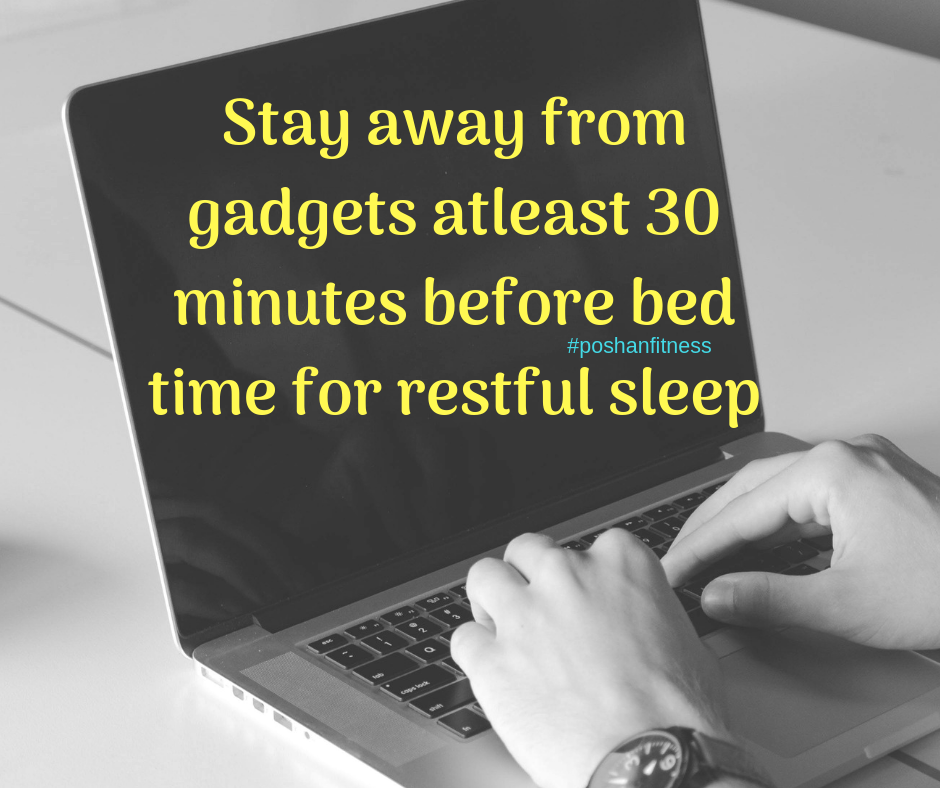Nutrition and Exercise are the thoughts that instantly come to our mind when we think about losing fat, improving health or strengthening our body. A critical factor or component that we tend to neglect is “Sleep”. Quality ‘zzzz’ or shut-eye is one of the most neglected and undervalued aspect of health.
If you have not got the desired results despite eating nutritious food and working out in a structured manner, the quality and quantity of your sleep should be analysed carefully. Clarity of thoughts, energy levels, performance in gym, digestion, immunity, depression, sex-drive and fat burn has a direct correlation to the proper/poor sleep you had in the previous nights.
Optimizing sleep pattern is crucial for health and weight loss. Studies suggest that, over a period of 6 years, people who sleep either less than 6 hours a night or those who do so for more than 9 hours have similar body composition outcomes and gain twice as much weight compared to those who sleep for 7-8 hours.
What happens when we sleep?
Restful sleep is when the sleep is deep, peaceful and without any body movement. During restful sleep our body repairs, rejuvenates and detoxifies itself so we wake up fresh having abundant energy for the next day. Our nerve cells are repaired ensuring faster communication inside our body happens, which means we can learn, memorize, and think faster and clearer.
Most of our hormones, including Thyroid stimulating hormone(TSH)Growth hormone (GH) and the sex hormones like testosterone , estrogen, Progesterone, LH etc are mostly secreted and released into the blood during sleep. Even though we slog in the gym for a chiselled/shredded look, the real chiseling happens when we sleep .
When we sleep after a workout, our muscles grow , restore and repair. Repaired muscles and optimal sex hormones are essential to sport that ripped look.
What happens when we sleep less?
Going for a weekend night out, pushing our work till the midnight, watching tv or a movie late night or any voluntary form of sleep reduction has become a mark of modern society.
Even if we sleep less for just or a single night or several, it will cause damage. Some of the things that occur when we sleep less are
- Decreased Thyroid function and Growth hormone
- Increased hunger hormone and Decreased satiety hormone
- Increased stress hormones – cortisol and Decreased insulin sensitivity
In short, Sleeping less is a perfect recipe for hormonal chaos leading to lifestyle diseases such as Diabetes, PCOS , High blood pressure, heart diseases, fertility problems, Hyper/hypo thyroid etc.
Are you hungry or sleep deprived?
When we are awake for longer time at night it is normal for us to feel hungry , as we need more energy to be awake than to sleep. Added to this our satiety hormone is reduced and hunger hormone is increased, which makes us raid our kitchen and eat energy dense processed junk food. Well, we don’t reach out for a fruit when we are hungry at 1am .
What affects our sleep?
Apart from the intended sleep curtailment, there are also other lifestyle factors that affect our sleep with or without our knowledge. Knowing those habits will help us change our lifestyle, which can improve our sleep quality.

- Exposure to artificial light around bed time
Artificial lights known as ‘blue light’ include light from lamps, devices like TV, Laptop, mobiles and other gadgets. The sleep hormone melatonin is produced only during darkness. Exposing ourselves to such gadgets and devices closer to bedtime will block the secretion of this hormone.
Sleep tip : Limit usage of devices(TV, phone, Ipad, Laptop) at least 30 minutes before bedtime. Reduce the intensity of lighting closer to bedtime.
- Lack of physical activity
Exercise reduces our stress and tires us out. Physical activity closer to the start of the day or noon is shown to have a positive impact on sleep as we get tired by the end of the day and fall asleep faster. This also improves the quality of sleep. Working out in the wrong way will also affect sleep and our results.
Sleep tip : Exercise in the mornings or early evenings to set your metabolism and sleep wake cycle right.
- Our last meal of the day
A large supper will rev up our metabolism and makes it harder for us to have a good night’s sleep. The sleep that we have after a heavy meal will be less repairing and restful as our body must digest the heavy meal which is still lying in our stomach.
Sleep tip: Eat a light/ moderately heavy meal 2-3 hours ahead of your bedtime.
- Mental stress and physical illness
Physical illness, depression and other stress related disorders are linked to elevated stress hormones – which results in sleep disturbances and reduces the quality of sleep.
Sleep tip : Try meditating a few hours before the bed time and create a peaceful bed time routine to reduce the stress hormones and to improve the quality of sleep.
Our sleep need, to restore our health to optimal may vary depending on our illness, age, mental stress(exams), stage of parenthood(new mom) and more.
The magic number or the amount of sleep each of us need to function at our best might vary between 7-8 hours , but the fact that sleep loss will reduce our productivity and performance be it in gym, home or at our workplace is certain.
Interested in losing fat and balancing hormones sustainably? Check out our programs
This article was originally written for and published in the October 2017 issue of ‘Stayfit’ magazine.
